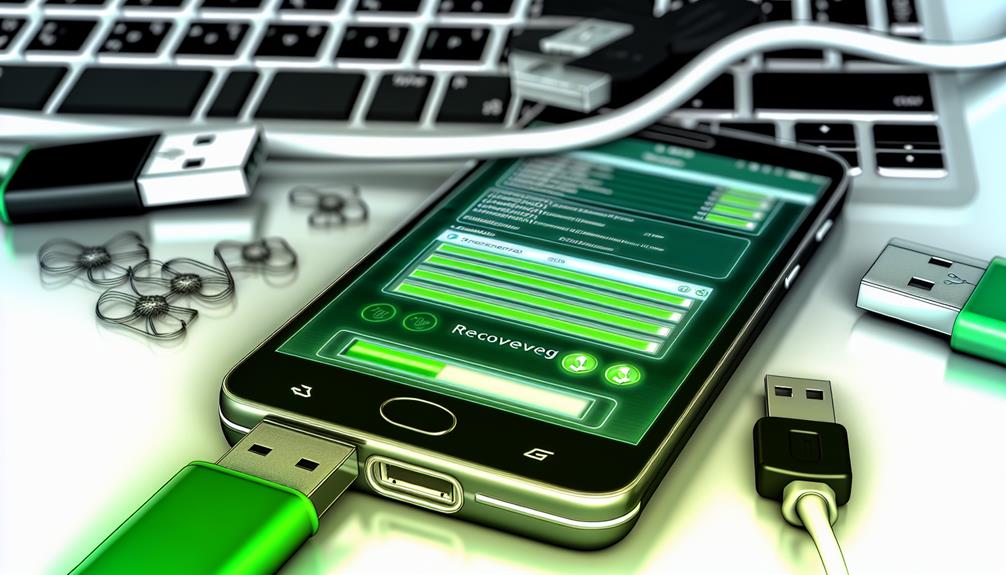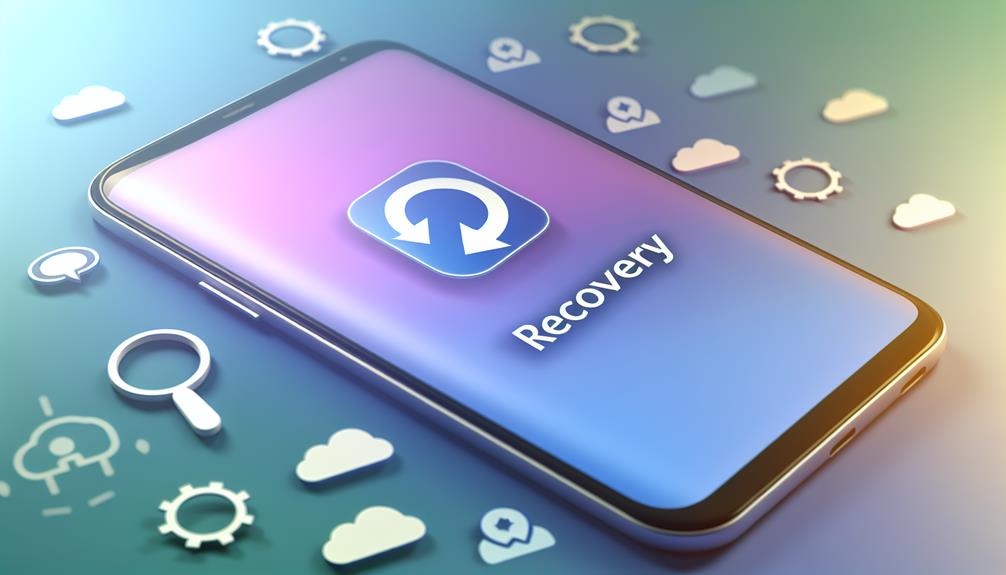Is it really possible to recover deleted messages on your Android device, or are they gone for good? Many users assume that once a message is deleted, it's lost forever, but there are several methods you can try that might restore those important texts. From checking hidden folders to utilizing backup options, the process can be straightforward if you know where to look. Before you panic about lost conversations, let's explore the steps you can take to potentially retrieve those messages you thought were gone.
Check the Recycle Bin
When you accidentally delete a message on your Android device, the first place to check is the Recycle Bin or Trash folder, depending on your messaging app. Many messaging applications have built-in recycle bin functionality that stores deleted messages temporarily, allowing you to recover them easily. It's essential to act quickly, as some apps may have a time limit on how long deleted messages remain in this folder.
Start by opening your messaging app and looking for a menu icon, usually represented by three dots or lines. Tap on it, and you should see options like "Deleted Messages," "Recycle Bin," or "Trash." If you find it, select it to view your deleted messages. You might be surprised to see how many messages are still retrievable.
Understanding message deletion implications is also important. When you delete a message, it doesn't always mean it's gone forever. Instead, it often just gets moved to the Recycle Bin. However, if you empty the Recycle Bin or the time limit expires, those messages might be permanently lost. As a result, regularly checking this folder can save you from losing important conversations.
If you locate the message you need, select it and look for a "Restore" option. This will return the message to your main inbox, making it accessible again. So remember, before panicking, always check the Recycle Bin or Trash folder; it could save you a lot of hassle!
Use Android Backup
One effective way to recover deleted messages on your Android device is by using the built-in backup feature. This feature allows you to store your data, including messages, in cloud storage. If you've set up your backup properly, you can easily retrieve your lost messages.
First, check your backup settings. Go to your device's Settings app, then look for the "Backup" section. Here, you'll see options to manage your backup frequency. It's crucial to have a regular backup schedule, so you don't lose important messages in the future. Ideally, you should back up your data daily or weekly, depending on how often you use your device.
Once you've confirmed that your messages were backed up, it's time to recover them. If you need to restore messages, follow the prompts in your backup settings. Usually, you'll find an option to restore your data from the last backup. Keep in mind that restoring might overwrite any new messages received after the backup was made, so proceed with caution.
If you haven't used the backup feature before, you may want to start now. Regularly backing up your data not only helps with message recovery but also protects your other valuable information on your device. By utilizing the cloud storage for backups, you guarantee that your messages are safe and can be recovered easily whenever needed.
Restore From Google Drive

Restoring messages from Google Drive is a straightforward process that can save you a lot of time and hassle. If you've been using Google Drive for message syncing, you're in luck! First, make certain you've backed up your messages to Google Drive. If you haven't done this yet, you can set it up in your device's settings under "Backup." Confirm that your messages are selected for backup.
When you're ready to restore, start by resetting your Android device. This process will prompt you to set up your device as new. During the setup, you'll reach a screen asking if you want to restore from a backup. Choose the option to restore from Google Drive. You'll need to log in to your Google account, so have your credentials ready.
Once logged in, select the most recent backup that includes your messages. The restoration process will begin, and it may take a few minutes depending on the size of the backup and your internet speed. After the process is completed, your messages should reappear on your device.
If you encounter any issues, double-check that your Google Drive account is linked to your device and that your internet connection is stable. Using Google Drive for message syncing not only simplifies the recovery process but also keeps your messages safe and accessible when you need them. With these steps, you can easily restore your messages and get back to communicating without missing a beat.
Utilize SMS Backup Apps
Utilizing SMS backup apps can be an effective way to safeguard your messages and guarantee they're recoverable when needed. These tools create copies of your texts, making certain you won't lose important conversations due to accidental deletions or device failures. When you're looking for reliable SMS recovery methods, backup apps should be at the top of your list.
There are several backup app recommendations that stand out for their functionality and ease of use. One popular choice is SMS Backup & Restore, which allows you to back up your messages to cloud services like Google Drive or Dropbox. This app is user-friendly and lets you schedule automatic backups, so you don't have to worry about forgetting to save your texts. Another great option is Helium, which not only backs up SMS but also other app data. It's ideal if you want a thorough backup solution.
Before you start using these apps, make sure to check their compatibility with your Android version. After installation, follow the prompts to initiate the backup process. It's also wise to perform backups regularly to keep your messages up to date.
In case you ever need to recover your messages, restoring from these backups is typically straightforward. Just open the app and follow the restoration process. By utilizing SMS backup apps, you can make certain that your important messages are always just a few taps away, providing peace of mind when it comes to your texts.
Employ Data Recovery Software

If you can't find your lost messages, employing data recovery software could be your best bet. You'll want to choose reliable software that suits your needs and follow the recovery steps carefully. This approach can help you restore important conversations that you thought were gone for good.
Choose Reliable Software
When it comes to recovering lost messages on your Android device, choosing reliable data recovery software is vital. Not all software is created equal, so it's important to do your research before deciding which one to use. Look for programs with positive user reviews and a solid track record of success. Software reliability is key; you want a program that effectively retrieves your messages without causing further issues.
Data security should also be a top priority. Make sure that the software you choose has a clear privacy policy and doesn't store or misuse your personal information. Check if the company provides updates and support, which can be a good indicator of their commitment to maintaining a trustworthy product.
Additionally, consider software that offers a trial version, allowing you to assess its effectiveness before committing to a purchase. This way, you can verify it meets your needs without risking your data. By investing time in selecting reliable data recovery software, you can greatly increase your chances of successfully retrieving your lost messages while keeping your data secure.
Follow Recovery Steps
Now that you've chosen reliable software, it's time to plunge into the recovery process. Start by installing the software on your computer and connecting your Android device via USB. Make certain USB debugging is enabled on your device; you can usually find this in the developer options.
Once connected, launch the software and select the appropriate option for message recovery. Most programs will present various message retrieval techniques tailored to different scenarios. Choose the one that best fits your situation—whether you're recovering deleted messages or lost messages due to a factory reset.
Next, the software will scan your device. This may take some time, depending on how much data you have. Once the scan is complete, you'll see a list of recoverable messages. Preview the messages to confirm they're the ones you need.
Contact Your Carrier
If you've lost important messages, contacting your carrier can be a helpful next step. Many carriers offer message recovery services or may be able to resend messages that were sent to you. Don't hesitate to reach out and ask about your options; you might be surprised at what they can do.
Carrier Message Recovery Services
Many users are unaware that their mobile carriers often provide message recovery services that can help retrieve lost texts. These services can be essential, especially if you've accidentally deleted important conversations. By contacting your carrier, you may find that they have specific protocols in place for recovering messages sent and received over their network.
Carrier protocols play a significant role in how messages are transmitted and stored. Depending on the carrier, they might maintain backup systems that could help restore your lost texts. Keep in mind, though, that message encryption is often used to guarantee the security of your communications. This feature, while vital for privacy, can sometimes complicate recovery efforts, as it limits access to your data.
To initiate the recovery process, reach out to your carrier's customer service department. Be prepared to provide relevant account information and details about the messages you're trying to recover. While there's no guarantee that all lost texts can be retrieved, carriers often have the best resources to assist you in your recovery efforts. So, don't hesitate to ask for help; it might just save those important messages!
Requesting Message Resend Options
After exploring the carrier message recovery services, another option you can consider is requesting message resend options directly from your carrier. Many carriers offer assistance in recovering lost messages, particularly if the issue stems from network problems or device settings.
Start by contacting your carrier's customer support. Explain your situation and ask if they can resend the missing messages. Some carriers have specific protocols for handling this, and they may require you to provide details like your phone number or the time the messages were sent.
Additionally, check your SMS settings on your device. Make sure that message forwarding is enabled, as this can affect how messages are received. If you're still having trouble, your carrier may suggest adjusting your SMS settings or resetting your network connection.
Remember that response times may vary, so it's important to be patient. If your carrier is unable to assist, consider looking for third-party apps or services that specialize in message recovery. Ultimately, reaching out to your carrier is often the first step in recovering lost messages on your Android device.
Prevent Future Message Loss

To prevent future message loss, implementing a few proactive measures can make a significant difference. By taking the time to set up safeguards, you can guarantee that your important conversations are protected. Here are some effective message safety tips to reflect upon:
- Regular Backups: Schedule routine backups to cloud services or local storage to keep your messages safe.
- Use Messaging Apps with Built-In Recovery Options: Choose apps that offer features for message recovery, guaranteeing you have options if things go wrong.
- Enable Automatic Syncing: Make certain your messages sync automatically with your cloud account, so you always have the latest information saved.
Don't overlook the importance of backup reminders. Set notifications to remind you when it's time to back up your messages. This simple step can prevent stress during unforeseen circumstances, such as accidental deletions or phone malfunctions.
Additionally, think about using encrypted messaging services that prioritize privacy and message safety. These platforms often include features that help protect your messages from unauthorized access, adding an extra layer of security.
Frequently Asked Questions
Can I Recover Deleted Messages Without Rooting My Android Device?
Yes, you can recover deleted messages without rooting your Android device. Various apps and services offer deleted message recovery and Android message retrieval, allowing you to restore your lost messages easily and safely.
How Long Do Messages Stay in the Recycle Bin?
Messages typically stay in the recycle bin for a limited time, often around 30 days, depending on your device's settings. After that, message retention policies may permanently delete them, so act quickly if needed.
What Is the Best SMS Backup App for Android?
Looking for the best SMS backup app for Android? Consider top backup applications like SMS Backup & Restore or Super Backup & Restore, which offer effective SMS restoration techniques to guarantee your important messages are safe.
Will Recovery Software Work on All Android Models?
Recovery software's effectiveness varies across Android models. While many tools are designed for broad compatibility, guarantee your chosen data recovery software supports your specific device to maximize the chances of successful message restoration.
Is There a Way to Recover Messages From a Broken Phone?
Did you know 43% of people experience phone damage? If your phone's broken, message retrieval might still be possible through specialized software or services, ensuring you don't lose important conversations. Explore your options!
Conclusion
In summary, recovering messages on your Android doesn't have to be an intimidating task. Did you know that around 70% of people accidentally delete important texts at least once? By checking the Recycle Bin, using Android's backup features, or employing SMS backup apps, you can greatly improve your chances of retrieving lost messages. Plus, staying proactive with regular backups can help prevent future message loss. Don't wait until it's too late—take action now to safeguard your important conversations!






Leave a Reply